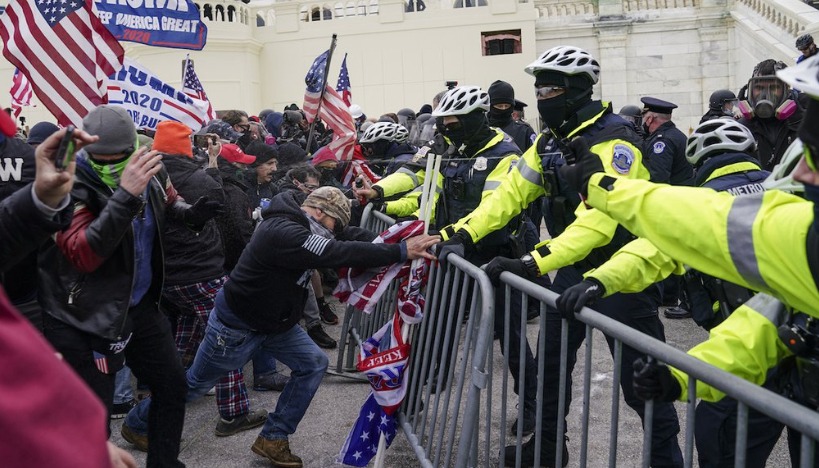The New York Times has delved deeper into the links between the indicted Donald Trump and Australian tycoon Anthony Pratt, whom Trump is accused of sharing U.S. nuclear submarine details with, revealing a complex web of interactions.
The crux of the matter is that investigators under special counsel Jack Smith, who’ve been probing Trump’s alleged sharing of classified intel with Pratt, might now possess strong evidence suggesting Trump’s disclosure was part of a broader quid pro quo between them. This could shift the probe from a mere classified document retention issue to a full-fledged espionage affair.
Earlier accounts portrayed Trump informally informing Pratt about two top-secret U.S. defense matters—how many nuclear arms U.S. submarines typically have and their proximity to Russian submarines without being detected. This information was allegedly shared during a casual Mar-a-Lago chat. Pratt is then said to have shared this with over 45 individuals, including journalists, his employees, Australian officials, and ex-Australian PMs.
Given Pratt’s core business is packaging materials, it’s puzzling why he’d be privy to such secrets and even more bewildering why he’d broadcast them. The latest Times article frames the Pratt-Trump connection as transactional.
After Trump’s presidential victory, Pratt became a Mar-a-Lago member and allegedly lavished Trump with money for privileged access. Pratt’s spouse gave $1 million to Trump’s inauguration; Pratt once bought a Wall Street Journal ad lauding Trump; and he supposedly paid a staggering $1 million for Mar-a-Lago New Year’s Eve tickets, far surpassing the typical “$50,000 or less” ticket cost.
This hefty sum wasn’t for Trump’s campaign but reportedly went straight to Trump’s enterprise. Additionally, Pratt claimed he paid Trump’s indicted attorney, Rudy Giuliani, around $1 million to grace his birthday, remarking, “Rudy might prove handy someday.”
In return for such generosity towards Trump’s ventures and allies, Pratt enjoyed perks like a spot in a presidential motorcade, mingling with Trump, sway with Trump’s Agriculture Secretary Sonny Perdue, and tax breaks augmenting his fortune.
Considering Pratt’s regular financial contributions to Mar-a-Lago and the reciprocal special treatment, Trump’s disclosure of submarine specifics shortly after his presidential loss appears in a new light. It might have been a calculated move, signaling to Pratt that he remained valuable.
Pratt’s subsequent boasting about acquiring these defense secrets to his business associates and Australian officials indicates he perceived Trump’s intel as a way to enhance his own stature and perceived influence.
The keen interest shown by Smith’s team in Trump’s chat with Pratt and Pratt’s subsequent actions now makes sense. The key question: Was Trump recklessly blabbing top military secrets, or was it a covert trade?
Evidence increasingly suggests a transactional nature to their relationship, as indicated by Pratt’s own discussions and records. Trump might have disclosed secrets for personal financial benefits.
This behavior aligns with the Espionage Act’s provisions.
While it remains uncertain if Pratt reciprocated Trump’s actions, it might not be essential for an espionage case. Espionage can also encompass scenarios where an informant divulges information generally for benefits. Astute corrupt officials know better than to overtly connect received benefits to specific acts.
In this scenario, Trump wasn’t casually spilling military secrets. It was a clear message: I remain informed. Your Mar-a-Lago membership can still benefit you, provided the contributions persist.
It’s unclear if Smith’s team will press espionage charges against Trump. Proving such a case might be harder than just finding classified documents scattered around Mar-a-Lago. The existing felony charges against Trump might not necessarily intensify with the addition of espionage unless prosecutors unearth another instance of this give-and-take relationship. If discovered, it’d be challenging to justify excluding espionage from Trump’s alleged offenses.
Understanding the Trump-Pratt Controversy: A Breakdown
The recent news regarding the ties between Donald Trump and Australian businessman Anthony Pratt has generated quite a buzz. For those unfamiliar with the story’s nuances or the key players involved, here’s a primer to help you navigate the details.
Key Players:
- Donald Trump: The 45th President of the United States, business magnate, and television personality. After leaving the presidency, Trump faced various legal investigations, with the current one involving potential espionage and classified information disclosure.
- Anthony Pratt: An Australian multibillionaire whose core business revolves around packaging materials. Despite no obvious ties to defense or military sectors, he’s central to this controversy due to alleged exchanges with Trump.
- Jack Smith: A special counsel, which means he’s been appointed to investigate a particular issue. In this case, Smith is examining Trump’s potential mishandling and disclosure of classified information.
- Rudy Giuliani: Once New York City’s mayor, Giuliani later became a personal lawyer for Donald Trump. He’s mentioned in the context of receiving payments from Pratt.
Key Terms:
- Espionage: The act of obtaining secret or classified information without the permission of the holder of the information. This can be for personal gain, or to benefit another entity or country.
- Mar-a-Lago: A resort and national historic landmark in Palm Beach, Florida, owned by Donald Trump. It has been dubbed the “Winter White House” due to Trump’s frequent visits during his presidency.
- Transactional Relationship: A kind of relationship where both parties benefit, often materially. In the context of the article, it refers to the potential exchange of favors or information between Trump and Pratt.
- Quid Pro Quo: A Latin term meaning “something for something.” It refers to a mutual exchange, where one thing is given in return for another. This term is central to the investigation, as it’s being examined if Trump shared classified information in exchange for personal or monetary benefits.
Background:
The crux of the investigation is whether Trump, after losing the presidency, divulged classified U.S. nuclear submarine details to Pratt during casual conversations at Mar-a-Lago. This is significant because such information is deemed vital to national security. The disclosure of such information to unauthorized individuals, especially if done for personal gain, can be considered an act of espionage.
Further complicating matters is Pratt’s alleged sharing of this classified information with over 45 people, which raises questions about his motives and the potential ramifications of such widespread dissemination.
The investigation is also looking into the nature of Trump and Pratt’s relationship, with evidence suggesting it may have been transactional. Pratt’s significant financial contributions to Mar-a-Lago and Trump-related ventures, combined with Trump’s potential sharing of classified information, paint a picture of possible quid pro quo.
Conclusion:
The Trump-Pratt controversy dives deep into the realms of politics, business, and national security. As investigations continue, understanding the key players, terms, and background can help in comprehending the gravity and implications of the situation.








